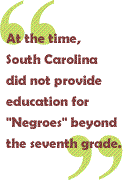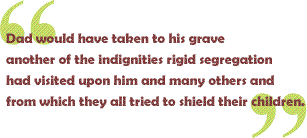My
father was over 40 years old when he took and passed an entrance
exam, and matriculated at Morris College in 1941. He excelled
as a student but was not allowed to enter  his
senior year because he had not provided proof of having graduated
high school. He had not because he could not.
his
senior year because he had not provided proof of having graduated
high school. He had not because he could not.
My
dad, Enos Lloyd Clyburn, was the youngest of three boys born
to William Clyburn and Phoebe Lloyd Clyburn on December 23,
1897 in Kershaw County. Although he loved school and had a
great thirst for knowledge, at the time, South Carolina did
not provide education for "Negroes" beyond the seventh
grade. So he repeated the seventh grade three times before
being declared too far advanced of the other students and
not allowed to return. He got a job in a bakery shop, but
continued to study.
By
the time Almeta Dizzley reached high school in the 1930s South
Carolina had begun providing high school education for blacks.
She convinced her father to allow her to go to Camden and
work as a Live-In with the Dibbles family, Columbia mortician
Perry Palmer's grandparents. They paid her, in part, with
tuition payments to Mather Academy.
During
this time she met, and made a decision to marry, Enos, a widower
since July 21, 1929. But wanting to finish high school first,
she left Mather Academy after the tenth grade, because it
required 12 years to graduate. She transferred across the
street to Jackson, a public high school that only required
11 years. She received her high school diploma in June 1937
and married Enos on July 23. They subsequently moved to Sumter,
in large measure because Morris College was there, and they
both yearned to further their educations.
Almeta
did not have Enos' problem, she had her high school diploma.
So after graduating from Garners Beauty School and running
a beauty shop for a number of years, she entered Morris and
graduated in 1953, when I was 13 years old, my brothers John
and Charles 11 and 9 respectively. She was very proud of that
Bachelor's degree, and hung it on a wall in Clyburn's Beauty
Shop, which she continued to operate while attending Morris
and returned to full time after graduating. Mom died August
23, 1971, a victim of multiple myeloma. But this column is
about Dad.
 Although
I have memories of my father attending Morris, I never fully
realized the import of his dropping out before graduation
until a chance meeting with Reverend T. M. Dixon in Hampton
County when I was running for Secretary of State in 1978.
Later that night when I shared with my dad what I had heard
from Reverend Dixon he told me the full story.
Although
I have memories of my father attending Morris, I never fully
realized the import of his dropping out before graduation
until a chance meeting with Reverend T. M. Dixon in Hampton
County when I was running for Secretary of State in 1978.
Later that night when I shared with my dad what I had heard
from Reverend Dixon he told me the full story.
I
wept. Not so much because of the reason he was not allowed
to graduate, but because were it not for that chance meeting
with Reverend Dixon, I may not have ever known. Dad would
have taken to his grave another of the indignities rigid segregation
had visited upon him and many others and from which they all
tried to shield their children. I would have been robbed of
another useful incentive. My Dad died shortly thereafter on
May 5, 1978. He was eighty years old.
I
can only imagine how proud my dad would have been to receive
his Bachelor of Theology Degree back in 1945. But I know how
proud I, my siblings, John, Charles and Tosha, our children,
grandchildren, and spouses were to receive it on his behalf,
May 10, 2003. Morris College did our family and, hopefully
it's family, proud.

